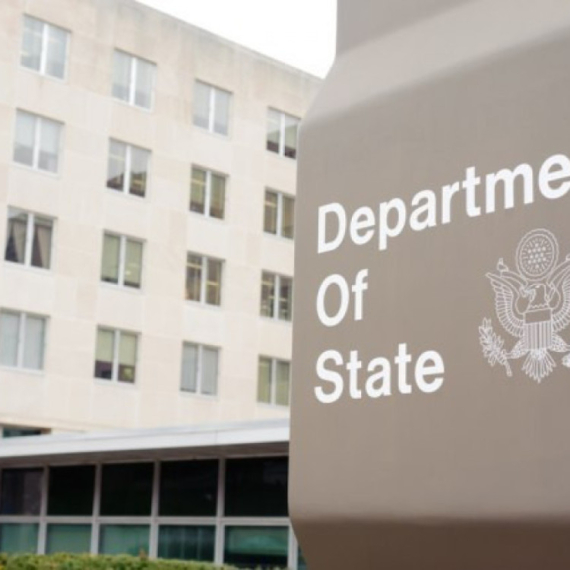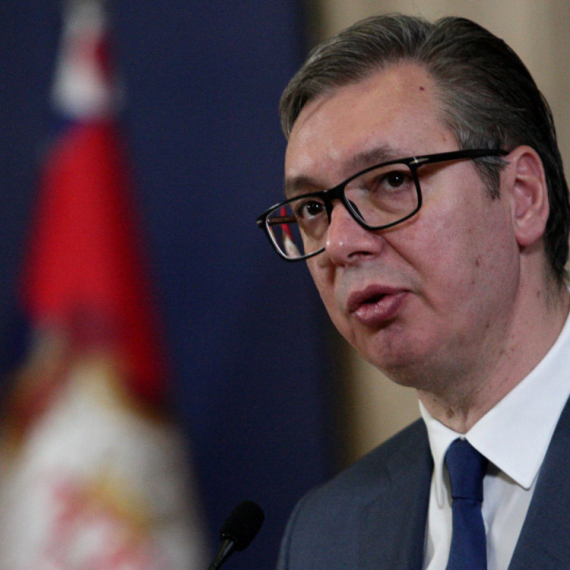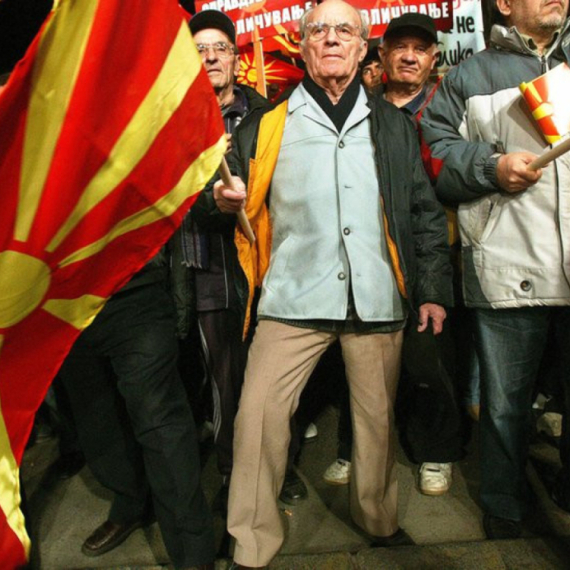FM addresses African Union Council
Foreign Minister Vuk Jeremić is attending the African Union Council session in Addis Ababa; Ethiopia denies entry to a Kosovo Albanian delegation.
Thursday, 28.01.2010.
09:40

Foreign Minister Vuk Jeremic is attending the African Union Council session in Addis Ababa; Ethiopia denies entry to a Kosovo Albanian delegation. Jeremic on Thursday welcomed the fact that as many as 80 percent of the member-states of the African Union (AU) had not recognized Kosovo and called on them to maintain such a stand. FM addresses African Union Council "In the name of the Republic of Serbia, I would like to express my profound appreciation to the over eighty percent of African Union countries that have not recognized the separatists in Kosovo. Your support for our sovereignty and territorial integrity is truly gratifying," Jeremic said in Addis Ababa. "I have come here to plead that you maintain your principled reservation on the Kosovo issue," Jeremic said. "This case will constitute a strong precedent. It marks the first time ever that the Court has been asked to consider the legality of a unilateral attempt by an ethnic minority to secede from a UN member State in peacetime, in defiance of its Constitution and the will of the Security Council.” "We ask all the non-recognizing countries represented in this room to stay the course, by not accepting Kosovo's attempted secession. We do so not only in the name of our traditional ties of friendship, but in the name of working together to consolidate a rules-based international order for the 21st century-one in which secession is clearly seen as a dangerous threat, and one in which reaching agreement between the parties is the only legitimate, sustainable way forward," said Jeremic. "From the onset of this grave crisis, we decided to respond to the illegitimate effort to forcibly partition Serbia in a peaceful manner, and with maximal restraint. We chose to harness all the diplomatic resources at our disposal to counter secession, and contain its potentially destabilizing consequences. Thanks to the overwhelming support achieved in the UN General Assembly, the International Court of Justice was tasked with ruling on the legality of Kosovo's attempt at secession. The Court's decision is expected this year.” "Accordingly, the Court's conclusions will have extensive consequences for the entire international community-perhaps for African Union states most of all. Imagine how many UN member States of this great continent would be affected by the legitimization of forcible partition. The borders of every multiethnic state could be threatened, producing instability in all corners of Africa. Progress, development, human rights, and ultimately-peace, would be jeopardized. The achievements of generations of African statesmen would be set back, as the number of crises multiplies,” the Serbian minister told the gathering. "That is why it is imperative-why it is absolutely critical-for the Court to be allowed to do its job, unhindered by political pressures, such as further recognitions of Kosovo's separatists. It is the only way to avoid doing any further damage to the legitimacy of the international system and the universality of the values we hold in common," said Jeremic. He also recalled that Serbia stood firmly with Africa throughout its contemporary history, while Belgrade hosted the First Non-Aligned Movement Summit in 1961. "In the political sphere, I want to underline that Serbia will soon join the European Union. At the same time, we will keep emphasizing our conviction that international stability and prosperity cannot be consolidated without taking into account the views of important actors on the world stage, such as the African Union," Jeremic said. As a member of the EU, Serbia will be a bridge between the EU and AU, noted Jeremic. "We believe that, in the interdependent world of the 21st century, Serbia's membership in the European Union would give a new, more profound meaning to our relations with AU member states. This would not only ensure that more than forty African nations would have a true friend in Brussels, but it would also lead to an increase in both understanding and cooperation between the two Unions," said Jeremic. "Let me underline the fact that as an observer country, Serbia fully supports the Vision and Objectives of the African Union, rooted in the United Nations Charter-including those provisions related to the obligation to uphold the sovereignty and territorial integrity of states," concluded the Serbian foreign minister. Vuk Jeremic (FoNet, file) No visas Kosovo Albanian government Foreign Minister Skender Hyseni and other members of a delegation sent by the government in Pristina could not attend the African Union gathering. FoNet news agency learned from the Serbian embassy in Addis Ababa that this happened because they were denied entry visas. The decision came after Serbia’s intervention, the agency added. Jeremic thanked his Ethiopian counterpart Seyoum Mesfin on this principled gesture, the report said.
FM addresses African Union Council
"In the name of the Republic of Serbia, I would like to express my profound appreciation to the over eighty percent of African Union countries that have not recognized the separatists in Kosovo. Your support for our sovereignty and territorial integrity is truly gratifying," Jeremić said in Addis Ababa."I have come here to plead that you maintain your principled reservation on the Kosovo issue," Jeremić said.
"This case will constitute a strong precedent. It marks the first time ever that the Court has been asked to consider the legality of a unilateral attempt by an ethnic minority to secede from a UN member State in peacetime, in defiance of its Constitution and the will of the Security Council.”
"We ask all the non-recognizing countries represented in this room to stay the course, by not accepting Kosovo's attempted secession. We do so not only in the name of our traditional ties of friendship, but in the name of working together to consolidate a rules-based international order for the 21st century-one in which secession is clearly seen as a dangerous threat, and one in which reaching agreement between the parties is the only legitimate, sustainable way forward," said Jeremić.
"From the onset of this grave crisis, we decided to respond to the illegitimate effort to forcibly partition Serbia in a peaceful manner, and with maximal restraint. We chose to harness all the diplomatic resources at our disposal to counter secession, and contain its potentially destabilizing consequences. Thanks to the overwhelming support achieved in the UN General Assembly, the International Court of Justice was tasked with ruling on the legality of Kosovo's attempt at secession. The Court's decision is expected this year.”
"Accordingly, the Court's conclusions will have extensive consequences for the entire international community-perhaps for African Union states most of all. Imagine how many UN member States of this great continent would be affected by the legitimization of forcible partition. The borders of every multiethnic state could be threatened, producing instability in all corners of Africa. Progress, development, human rights, and ultimately-peace, would be jeopardized. The achievements of generations of African statesmen would be set back, as the number of crises multiplies,” the Serbian minister told the gathering.
"That is why it is imperative-why it is absolutely critical-for the Court to be allowed to do its job, unhindered by political pressures, such as further recognitions of Kosovo's separatists. It is the only way to avoid doing any further damage to the legitimacy of the international system and the universality of the values we hold in common," said Jeremić.
He also recalled that Serbia stood firmly with Africa throughout its contemporary history, while Belgrade hosted the First Non-Aligned Movement Summit in 1961.
"In the political sphere, I want to underline that Serbia will soon join the European Union. At the same time, we will keep emphasizing our conviction that international stability and prosperity cannot be consolidated without taking into account the views of important actors on the world stage, such as the African Union," Jeremić said.
As a member of the EU, Serbia will be a bridge between the EU and AU, noted Jeremić.
"We believe that, in the interdependent world of the 21st century, Serbia's membership in the European Union would give a new, more profound meaning to our relations with AU member states. This would not only ensure that more than forty African nations would have a true friend in Brussels, but it would also lead to an increase in both understanding and cooperation between the two Unions," said Jeremić.
"Let me underline the fact that as an observer country, Serbia fully supports the Vision and Objectives of the African Union, rooted in the United Nations Charter-including those provisions related to the obligation to uphold the sovereignty and territorial integrity of states," concluded the Serbian foreign minister.
No visas
Kosovo Albanian government Foreign Minister Skender Hyseni and other members of a delegation sent by the government in Priština could not attend the African Union gathering.FoNet news agency learned from the Serbian embassy in Addis Ababa that this happened because they were denied entry visas.
The decision came after Serbia’s intervention, the agency added.
Jeremić thanked his Ethiopian counterpart Seyoum Mesfin on this principled gesture, the report said.


























































Komentari 53
Pogledaj komentare